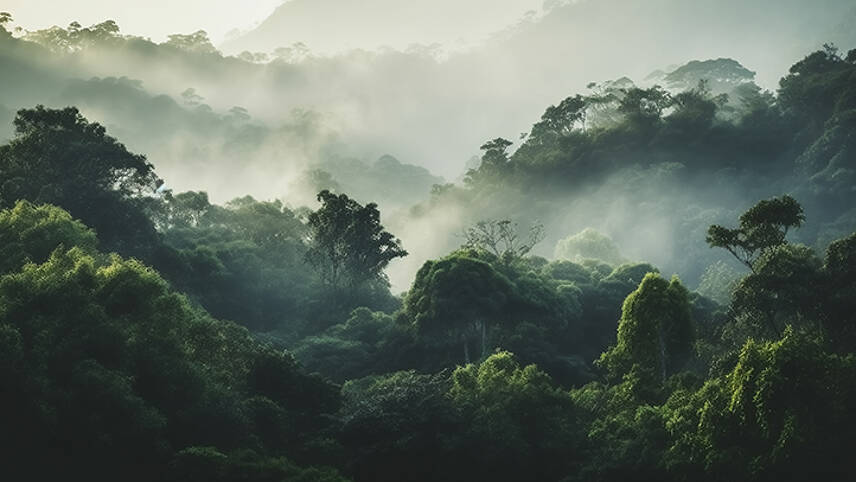Register for free and continue reading
Join our growing army of changemakers and get unlimited access to our premium content

There is an unacknowledged problem at the heart of the fight against climate change. It’s not big oil, or individuals’ reluctance to change their lifestyles. It’s not the difficulty of a fast, fair transition to cleaner energy, or the uncertainties around when certain ‘tipping points’ will be reached. It’s drugs.
Traditionally these two issues have been seen as distinct and unrelated. One is to do with criminality, violence and health. The other is to do with nature, emissions and the future habitability of this planet. But in a new report out today, we show how, in fact, these two agendas are inextricably linked, and how we won’t stop climate change without changing international drug policy.
The top line is that criminalisation of drug production and consumption is driving widespread environmental damage and getting in the way of efforts to stop climate change. Prohibition has created an unregulated and immensely powerful shadow economy, which is a major obstacle to progressive reform in many countries with hugely valuable and threatened ecosystems.
Indeed, the most commonly hailed international policy initiatives for environmental mitigation and adaptation, such as land reform and sustainable supply chains, are actively undermined by the impacts of drug prohibition.
In places like Brazil, Mexico, Thailand and West Africa drug production and trafficking takes place in remote biodiverse areas, such as tropical rainforests, which are essential to regulating global climate. It is precisely because it is illegal that this activity takes place on the margins, in these environmentally sensitive areas. This in turn opens the way for further environmentally damaging economic activity, such as agribusiness and extractive industries.
Indeed, there is a link between drug production and other activities that harm the environment, entrench inequality and drive human rights abuses. Drug barons often ‘diversify’ their portfolios, reinvesting profits from the drugs trade into activities like mining, timber trafficking, and cattle ranching.
In Central America, researchers found that the majority of lands deforested by ‘narcos’ are – in theory – subject to environmental protections. For example, the Upper Guinean forest of West Africa has lost nearly a quarter of its trees in the last 20 years – the same time period in which it has become an active part of the West African cocaine trafficking ecosystem. Illicit logging in Guinea has long been controlled by the military. In 2021, the civilian government announced a total ban on deforestation. By September, that government had been thrown out in a military coup and state-sponsored logging had resumed.
The illicit and violent activity that surrounds drug production and trade also destabilises societies and embeds violence and corruption. It undermines governance and the rule of law, with powerful ‘narcos’ running a de facto state via coercion, bribes and threats. Their activity corrupts politicians, perverts public policy, sucks up public budgets on policing and security, and directly prevents indigenous people and land rights activities from protecting natural habitats.
Global Witness’ most recent figures show that in 2022, almost two-thirds of all the killings of environmental defenders across the globe occurred in just three countries: Colombia, Mexico and Honduras. These three locations have one thing in common: they all play a critical role in the production and trafficking of cocaine and other drugs to the US, Europe and other global markets. In 75% of cases, the murders of environmental defenders could not be linked to any legitimate industries
The environmental movement, including mainstream organisations like Greenpeace and WWF, must recognise the links between drug policy and climate change and start addressing them. Environmental organisations didn’t use to talk about diet in their campaigns, but now it’s widely accepted that part of the solution to climate change lies in consumers in rich countries eating less meat. This is partly thanks to pressure from other activists, urging their fellow campaigners to see and act on the connections. In time, we hope the same shift will happen for drug policy. When you look, the links are everywhere.
The key point is that this shift in attitude, and a willingness to engage in drug policy reform conversations, would be in the environmental movement’s best interests. Conversely, if they don’t acknowledge the elephant in the room, so many of their deeply well-intentioned and well-informed efforts will come to nothing in the face of the criminality and environmental destruction driven by drugs.
Ahead of the 30th UN climate change conference, which will be hosted in Brazil in 2025, we are urging organisations and individuals to open their eyes, and join the dialogue on drug regulation, with the aim of designing a new legal regulatory system that complements action on environmental and climate justice. We won’t stop deforestation and climate change without reforming drug policy.
Clemmie James is Coordinator, International Coalition on Drug Policy Reform & Environmental Justice. The coalition’s members include Health Poverty Action, SOS Amazonia, and scientists and activists from Brazil, Colombia, and the US, who have come together to raise awareness of how current drug policies undermine environmental justice.



Please login or Register to leave a comment.